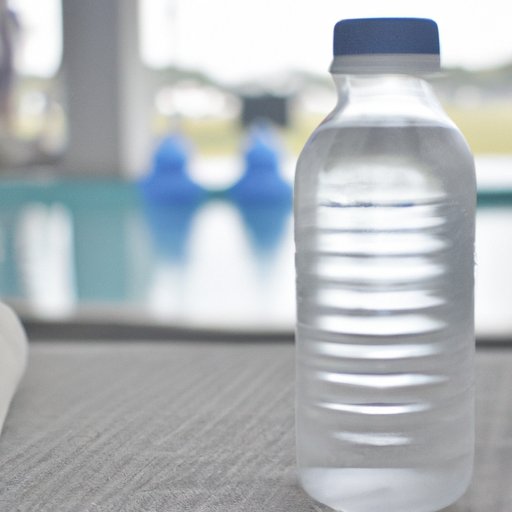Introduction
Adequate hydration is essential to ensure optimal health. The recommended daily intake of water for adults is 2.7 liters (91 ounces) for women and 3.7 liters (125 ounces) for men. However, this number may vary depending on individual circumstances. In this article, we’ll discuss the benefits of drinking adequate amounts of water each day, health risks of dehydration, and how different beverages, activity levels, and environment can affect your water intake needs.

Benefits of Drinking Adequate Amounts of Water Each Day
Drinking enough water has countless benefits for the body. Here are some of the most notable ones:
Improved Energy Levels and Mood
Staying adequately hydrated helps keep your energy levels and mood up throughout the day. According to a study published in the Journal of Nutrition, even mild dehydration can lead to fatigue and reduced alertness.
Enhanced Physical Performance
Hydration is key for optimal physical performance. A study published in the Journal of Strength and Conditioning Research found that athletes who drank more water during exercise had improved endurance and strength.
Increased Mental Clarity
Being dehydrated can impair cognitive function and reduce focus. A study published in the British Journal of Nutrition showed that even mild dehydration can negatively affect memory, concentration and reaction time.
Improved Skin Health
Drinking plenty of water helps keep your skin looking healthy and radiant. Dehydration can cause dry skin and wrinkles, so it’s important to stay hydrated to keep your skin looking its best.
Health Risks of Dehydration
When the body doesn’t get enough water, it can be dangerous. Here are some of the potential health risks associated with dehydration:
Symptoms of Dehydration
The first sign of dehydration is usually thirst. Other symptoms include dry mouth, headache, fatigue, dizziness, confusion, irritability, and dark-colored urine. If left untreated, dehydration can lead to more serious health issues.
Potential Risks of Prolonged Dehydration
Prolonged dehydration can lead to kidney stones, low blood pressure, heat exhaustion, heat stroke, and even death. It’s important to stay hydrated to avoid these potentially dangerous conditions.

Impact of Different Beverages on Hydration Levels
Not all beverages are created equal when it comes to hydration. Here’s what you need to know:
Comparison of Water Versus Other Beverages
Water is the best choice for hydration. It’s calorie-free, inexpensive, and readily available. Other beverages such as sports drinks, tea, and juice can also help hydrate the body, but they contain added sugars and calories. It’s best to limit these beverages and stick to plain water whenever possible.
Understanding Caffeine and Alcohol’s Effect on Hydration
Caffeinated and alcoholic beverages can act as diuretics, meaning they can make you lose more water than you take in. To offset their dehydrating effects, it’s important to drink an extra glass of water for every cup of coffee or alcoholic beverage you consume.
Activity Level and Environment Affects Water Intake Needs
Certain activities and environments can require you to drink more water than usual. Here’s what you need to know:
Active Individuals and Higher Temperatures Requiring More Water Intake
If you’re an active individual or live in a hotter climate, you’ll likely need to drink more water than the average person. According to a study published in the American Journal of Physiology, active individuals need to drink extra fluids to replace the water lost through sweat.
Travel and Air Travel Affecting Water Needs
Traveling, especially by plane, can make you more prone to dehydration. The dry cabin air and lack of movement can cause dehydration. It’s important to drink plenty of water while traveling and during air travel to stay properly hydrated.
Conclusion
Adequate hydration is essential for good health. Staying hydrated can improve energy levels and mood, enhance physical performance, increase mental clarity, and improve skin health. Dehydration can cause a range of symptoms and potentially lead to more serious health issues. Water is the best choice for hydration, but other beverages such as tea and juice can also help. Activity level, environment, and travel can also affect water intake needs. To stay adequately hydrated, it’s recommended that adults drink 2.7 liters (91 ounces) for women and 3.7 liters (125 ounces) for men each day.
(Note: Is this article not meeting your expectations? Do you have knowledge or insights to share? Unlock new opportunities and expand your reach by joining our authors team. Click Registration to join us and share your expertise with our readers.)
